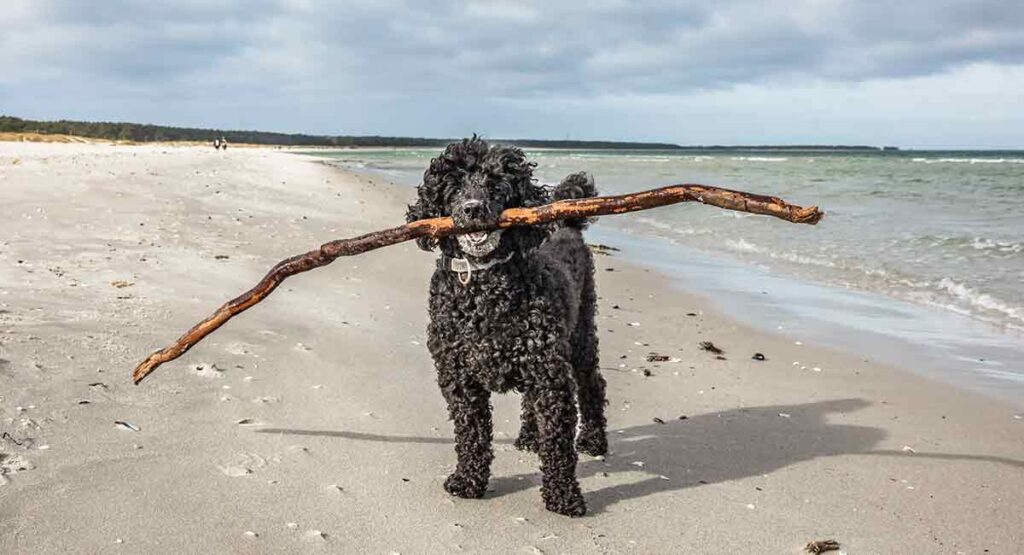
The athletic Standard Poodle is the largest variety of the breed. While any Poodle over 15 inches is classed as a Standard size, most will grow up to 24 inches tall, and weigh 40 to 70 pounds when full grown. This is an energetic, playful canine, that needs more exercise than the miniature and toy poodle breeds. But with the right training and grooming, these loyal and agile dogs make great low allergen pets for an active family.
Contents
- Appearance, colors & markings
- Training and exercise
- Do Standard Poodles make good family pets?
- Adopting vs buying a puppy
History and Original Purpose
The American Kennel Club first recognized the Poodle as a breed in 1887. The Standard Poodle is thought to have originated from Germany as a breed of water retriever. The word Poodle probably comes from the German word Pudel.
Some argue that the poodle is a descendent of the French Barbet dog. What we do know is that this is an old breed, with a history stretching back to the 15th century at least.
The Standard Poodle’s distinctive continental cut seen in the video above and in show rings around the world, has evolved from the way poodles were shaved by their hunter owners in the past.
Owners clipped their Poodles’ rear ends to make it easier for them to swim and retrieve waterfowl. The bands left at their ankles are supposed to have kept their joints warm in the harsh waters.
Most modern poodles are pets of course, and will benefit from an all over clipping or what’s known as a sport cut or clip, every four to six weeks throughout the year.
The name “Poodle” is likely a derivation of the word “Pudel” and the word “Puddle”; an association drawn from its water dog routes.
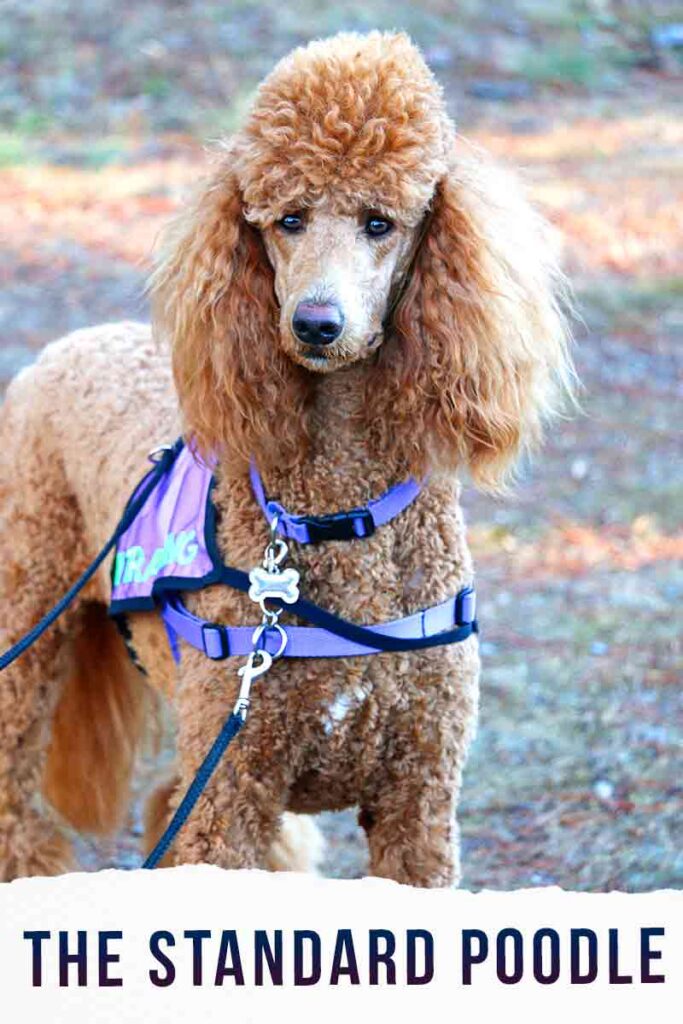
Standard Poodle Appearance
Standard Poodles are well proportioned dogs. That is, they are tall with even legs and backs, and a proud stature. Their eyes are dark ovals, and their ears hang close to their heads. Their skulls are rounded, but with defined flat cheekbones. Overall, they give the impression of elegance and grace.
Their coats come in two different types: curly or corded. The curly Poodle coat is harsh and dense all over, with an even spread of fur. The corded Standard Poodle has a coat of tight cords. They also have longer fur on their heads and bodies, but shorter on their ankles.
Colors
These dogs come in a fabulous range of colors:
- Apricot
- Black
- Blue
- Brown
- Cream
- Gray
- Red
- Silver
- Silver Beige
- White
The apricot Standard Poodle is a popular choice for mixed breed dogs, like the Labradoodle.
But There’s More!
There is also a range of bi-colored Poodles:
- Black and Apricot/Brown/Cream/Gray/Red/Silver/Tan/White
- Blue and White
- Brown and Apricot/White
- Cafe Au Lait
- Cream and White
- Gray and White
- Red and Apricot/White
- White and Apricot/Silver
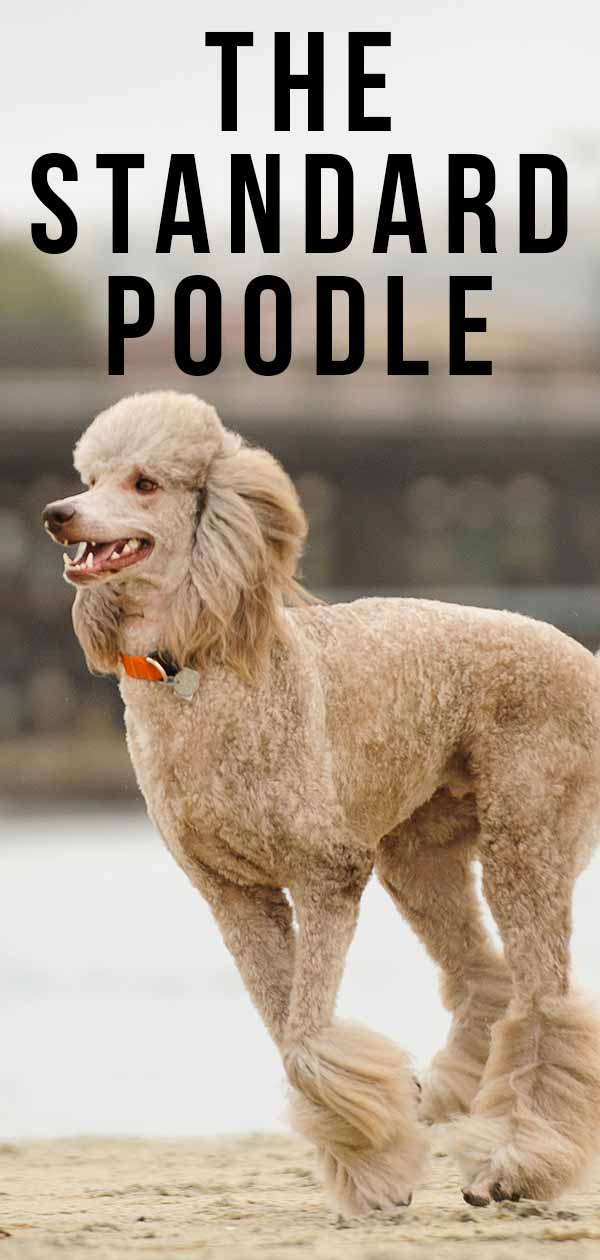
Markings
Standard Poodles can also be a mix of colors, usually expressed by distinct markings. For example, a black Standard Poodle might have white markings, or a red Standard Poodle could have black accents. These could be in the form of:
- Black markings, mask or points; or
- White markings or mask.
Today, Standard Parti Poodles (two colors with at least 50% white) are also increasingly popular, but fairly rare. This color type is not currently specified in the show breed standards. But, it is in-demand among Poodle puppy buyers.
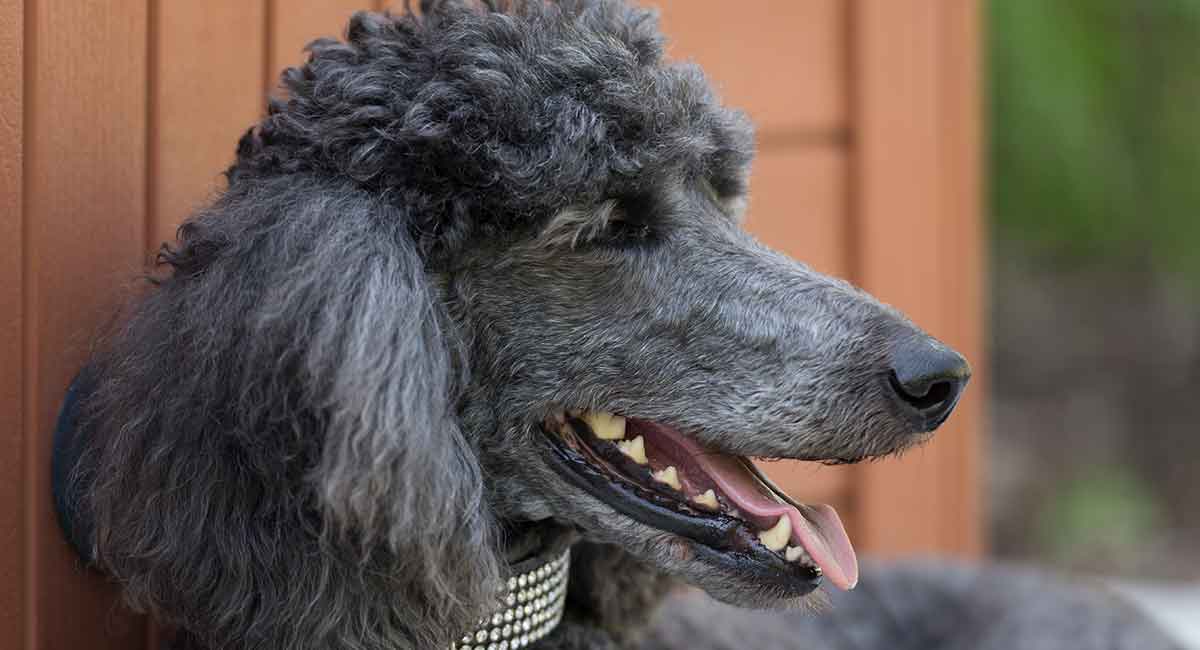
Are Standard Poodles Hypoallergenic?
In truth, no dog breed is entirely hypoallergenic. Dog allergens are found in dander, saliva, and urine – so every dog will have them. However, the Poodle’s tight curly or corded fur will often catch and trap dander, rather than letting it shed with fur.
So, many people with dog allergies find they show fewer symptoms around the Standard Poodle.
If you suffer from dog allergies, this could be a good choice. But, you will also need to groom your dog very regularly, and employ a strict cleaning regime. Wash your dog’s bedding regularly, and any soft toys that could soak up saliva.
Temperament Traits
Standard Poodles tend to be active, intelligent dogs. They have a reputation for being aloof. But, this is more a calm reserve with strangers. They are very loving and loyal to members of their family.
This quiet reserve also means that they are likely to be less distracted by other people when you want them to focus. Plus, they can be a sensitive breed, who will cringe or cower if you raise your voice to them. So, they are best handled gently, reflecting their own soft and adorable nature.
Despite being a highly active dog, a well exercised Poodle will be quite happy to relax and sleep next to you. They won’t race around the house. Instead, they will be a chilled-out companion as long as they have had sufficient daily exercise.
Homes with Small Children
Young Poodles, much like any juvenile dog, can be very bouncy. A lively young dog may need to be physically separated from a small child to prevent accidents.
It is important to remember that any dog, however reliable they may seem, should be supervised around small children. This is because dogs and children can accidentally injure each other. Keeping a close eye will ensure that you avoid any potential problems or stress for the dog.
They can have some guarding instincts, although these tend to be more in the vocal watchdog area.
Barking
Despite this quiet nature, Standard Poodles can be fans of their own voices. They tend to alert you to visitors, which is a trait that some families appreciate.
If you are not a fan of barking, then make sure to never react to your dog woofing. Also, the click for quiet technique can be very effective in reducing a noisy dog’s barking.
Training and Exercise
Despite their stereotype as being posh, stuck-up dogs, the Standard Poodle is actually a very clever and active, hard working dog.
Standard Poodle training is something that both the dog and owner can really enjoy and benefit from. In fact, Standard Poodles excel at co-operating with their handlers and have a great capacity for physical activity.
They also learn very quickly and can be taught numerous tricks and take part in a wide range of canine hobbies.
As sensitive dogs, they work most effectively when trained using positive reinforcement methods. This will keep them happy and motivated throughout your sessions together, as well as increasing the strong bond between you.
Socialization
Socializing your Standard Poodle puppy is an important way to help ensure that he or she grows up into a confident, happy adult dog. This should begin from the day you bring her home at 8 weeks old.
To start, you can carry her outside (until her vaccinations have been completed) to all the places you will want her to feel comfortable when she is older. Let her experience a variety of sites, sounds and smells.
Secondly, make sure you have lots of visitors over to your home, and that they all make her feel happy and comfortable.
All in all, if you let her associate strangers with pleasant experiences, she will be less likely to be wary of them approaching the house when she has grown up.
Standard Poodle Health and Care
Standard Poodles are a pedigree dog breed. Pedigree dogs with small populations like Standard Poodles will have greater problems with inherited diseases. However, this breed’s health can be very good, if you manage to avoid the genetic diseases.
Epilepsy
Idiopathic epilepsy is sometimes seen in Standard Poodles. It is thought to be an inherited condition. So, you should not buy a puppy with a parent or grandparent who has ever had a seizure.
Progressive Retinal Atrophy
Progressive Retinal Atrophy (PRA) is a genetic condition that leads to blindness in dogs. Fortunately, there is a DNA test for PRA, and you should ensure that both of your Poodle’s parents have had this test.
You should ask for proof that the puppy’s parents are “both clear” or “one clear and one carrier”.
Cataracts
There is no test for cataracts, but you can tell how healthy an adult dog’s eyes are with a veterinary eye test. Make sure that both parents have had eye examinations in the past year. The breeder should have certificates for these to show you.
Hip Dysplasia
You can significantly reduce the chances of getting a Poodle with hip dysplasia by only buying a puppy from parents with good hip scores. For instance, if you are In the US, make sure both parents’ hips are graded “Excellent” or “Good”.
von Willebrand’s Disease
Von Willebrand’s Disease (vWD) is an inherited blood clotting disorder, which causes excessive bleeding. It os important to ensure that both parents have had DNA tests for this disorder before you bring your puppy home.
Bloat
Bloat is a common issue in several large breeds of dog. It occurs when gas causes the stomach to become distended. To help avoid bloat, feed your dog several smaller meals a day. You can feed him at ground level and, if necessary, put his food into a slow-feed bowl.
Sebaceous Adenitis
Sebaceous adenitis is an inflammatory skin disease that can affect Poodles. It can cause itching, hair loss, infections, blistering and scaling of the skin.
There is not currently a DNA test for sebaceous adenines. So, it is important to ask your breeder whether any dogs in the line had skin problems.
Addison’s Disease
Addison’s Disease is an adrenal hormone disorder that causes problems with the dog’s blood composition. Symptoms can be quite vague and hard for the vet to diagnose. These symptoms include lethargy, gastro-intestinal issues, a low temperature and pain.
Autoimmune Haemolytic Anemia
Also known as Immune-Mediated Haemolytic Anemia, this condition occurs when the dog’s immune system destroys its own oxygen-carrying red blood cells. It causes the dog to become lethargic and to have abnormal breathing/pulse rates and pale gums.
There is no current DNA test for Autoimmune Haemolytic Anemia. So, you will need to ask about family history.

General Care
Standard Poodle care is very important. These are not low maintenance dogs. They require daily exercise, training, grooming and frequent company throughout the day.
You should check your Poodle’s ears and eyes regularly to ensure that they are clean and clear.
You will also need to clip their coat at least once every four weeks to keep it manageable. Take particular care to ensure that the coat is not getting into their eyes and irritating them or becoming matted around the feet or legs.
What is the Standard Poodle Lifespan?
The average Standard Poodle lifespan is around 12 years. They have shorter lifespans than their Miniature counterparts, who live on average 14 years. But, with good general care and a puppy from a reputable breeder, your Standard Poodle could live well into their teens.

Rescuing a Standard Poodle
There are many benefits to rescuing a Standard Poodle instead of buying one. For starters, you will also know whether an adult Poodle has any behavioral or temperament problems. This will give you a good idea if it’s a good fit for your family, especially if you have young kids.
This is a popular breed, so finding a Standard Poodle rescue shouldn’t be too hard. In fact, many countries have breed centers dedicated to the Poodle breed.
Finding a Puppy
Standard Poodle puppies are all beautiful. However, don’t let their cute faces distract you from their health and temperament. Your best chance at getting a healthy puppy is to make sure that the Standard Poodle breeders have carried out all available tests on both parents, and to ask lots of questions.
When you have found a breeder who fully health tests, you will probably have to go on a waiting list for a puppy. While you wait, arrange to meet the breeder and their dogs. Make sure that the parents are confident and laid back characters.
You can expect to spend anything from $1,500 to $3,000 on a puppy from health-tested parents. Prices can vary depending on local demand, puppy parentage, pedigree and more.
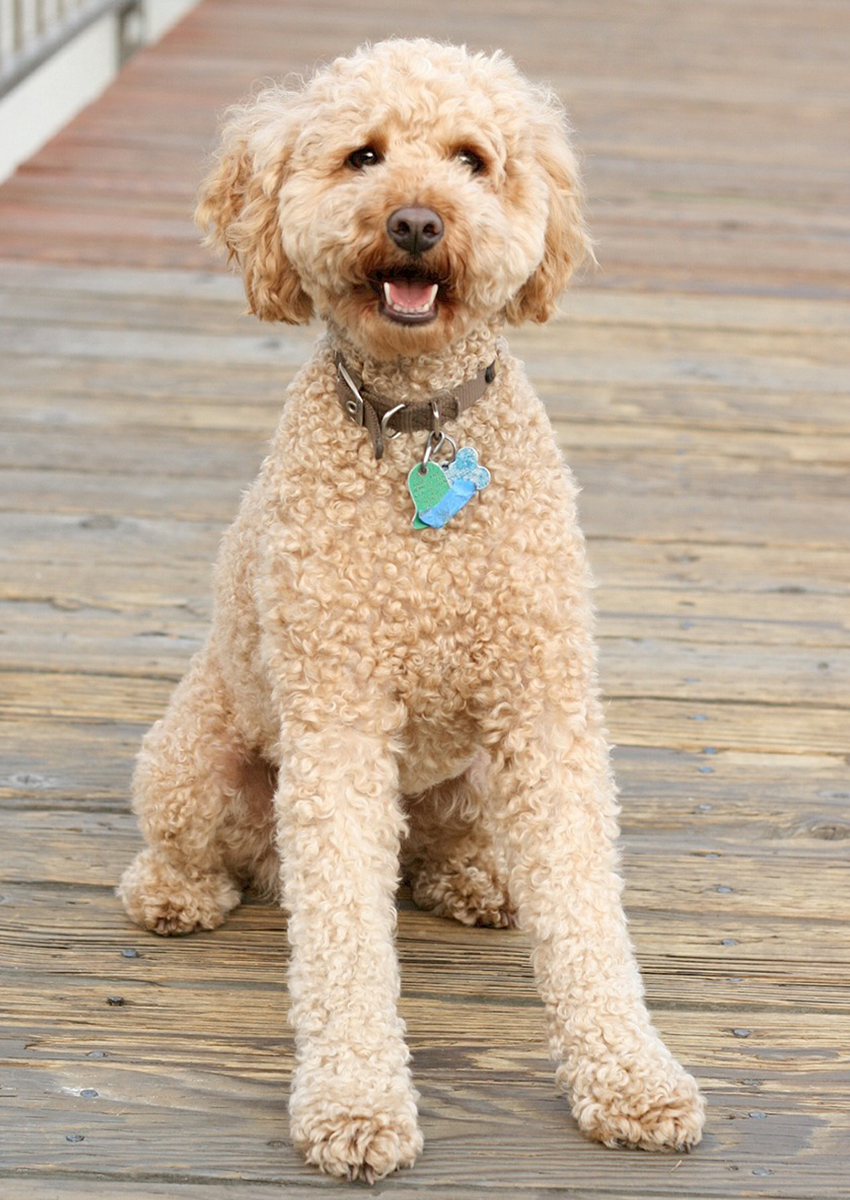
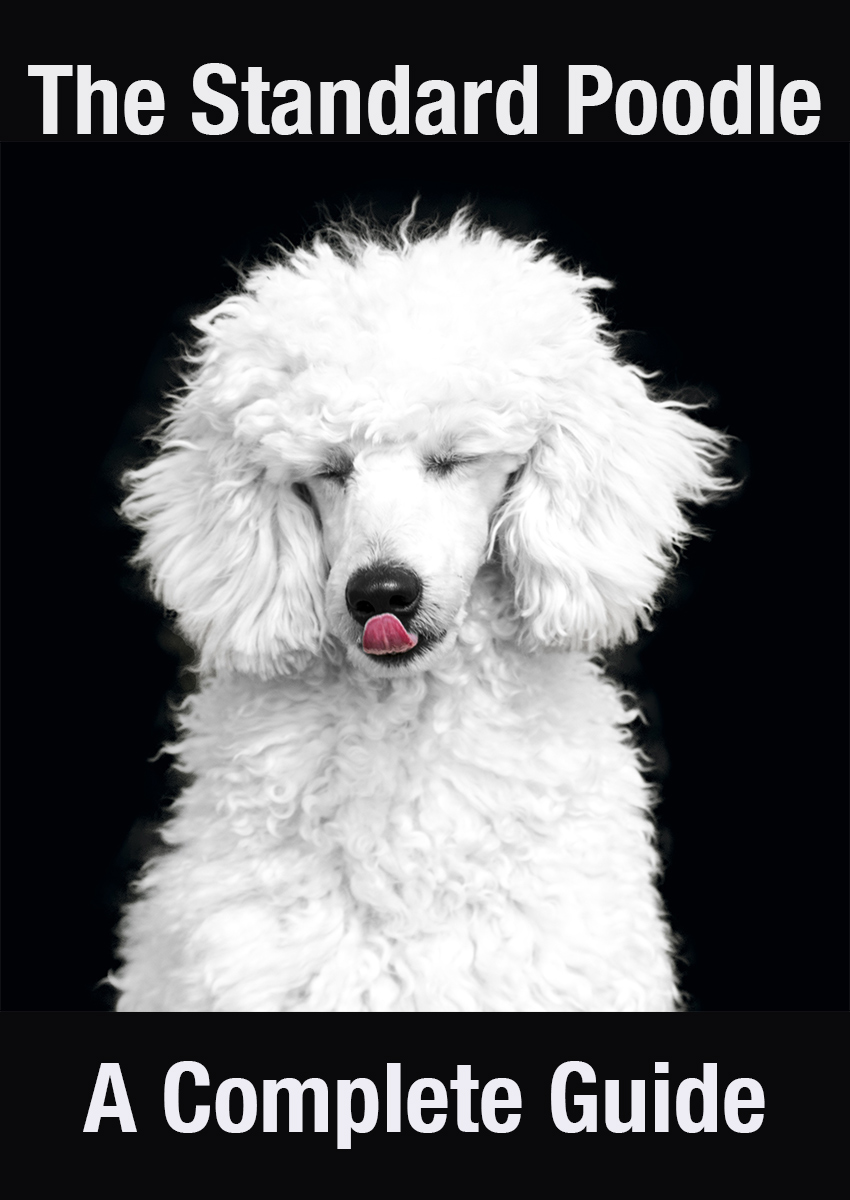

Ana says
We rescued a standard female in September of this year. She is great with the exception of adapting to the cats. She isn’t aggressive with them just wants to play and chase. I’m hoping she will calm down around them and learn to coexist calmly.
Kathi Kelley says
I got my first standard poodle 10 years ago from a shelter. We had eight wonderful years together. She was so smart and easy to train. I lost her 2 years ago due to cancer. I just got another rescue standard poodle 3 weeks ago. She was abandoned 6 months ago and taken in by a good person who had to give her up due to job changes. She is only 2 years old and very energetic. But we are working together on behavior and training.
Evon says
I grew up with standard poodles. I love their high energy and silly playfulness. I love that they play with their feet. I just purchased my second male standard. He was running the streets and his owners neighbor helped me catch him. I asked if I could have him for a small fee and later that day I picked him up. He is young but full grown and un-neutered, he has an appt in October. I am in heaven to have another poodle, my last one lived thirteen years.
Emmett Finlon says
We owned several dogs mostly Labs. After our last oldest Lab died, my wife purchased a Standard Poodle she was a wonderful companion. I severely injured my back. I was bedridden for close to a year & I laid in bed taking pain meds watching my IPAD.when our standard poodle was about six months old she got next to me one night and started watching movies with me. She would see something and then look at me for a reaction. After that it was every night and her favorite show was Trailer Park boys. She got really excited when we watched it. She was a brilliant dog. She passed this about six months ago and we recently had an opportunity to get another Standard Poodle. I enjoyed what you shared thank youn
Gary says
Looking for a standard poodle 8 months to 1 year prefer female chocolate.want her spayed and up to date on her meds
Diane Gardner says
I’ve had standards for almost 40 years… first 3 were rescues, last two sets from reputable breeders. I chose male litter mates.. currently I have a pair at 5 months old, they came home at 8 weeks. I’ve had male & female and I’ve not had a bad experience with any of them. My one female was a year old, underweight/beaten/grossly filthy when I found her.
She was an only dog & I wasn’t working, she was my constant companion. With patience and calm she became a sweet confident dog, she lived to be 17.
When I “met” my first standard, at a party of 100 ppl, food everywhere… he was the most polite/well behaved/non begging dog I’d ever seen. I spent the majority of the evening with him, I was smitten & had rescued my first within 6 months.
Elmarie says
I live in SA.we had standard poodles all along now my 12 year poodle had passed
We are home most of the time and are devestated.how do we go about to get another companion for my husband myself and my 20 year old poodle.i am not to clued up on internet.can someone please advise.kind regards Elmarie lategan
Anastacia says
Hi there. You can have a look at Poodle groups on Facebook. There are plenty of posts about surrenders and new litters being born at shelters. Hope you find a new furbaby<3
David says
Hi, we rescued a Standard Poodle at 9 months old. He’s beautiful and loving. He never bonded with anyone his first 9 months of his life so he’s very shy around other people and doesn’t like any loud noises. He didn’t even know how to play when we got him. We’ve had him about 4 months now and he’s still somewhat aloof with us. It’s just my wife and myself so there’s not a lot of commotion all the time. I take him on several short walks a day and he enjoyed them at first but now seems to be afraid to go for some reason. We take him to a dog daycare twice a week and he loves it. He loves others dogs and even the staff there. So now we are thinking about getting another dog. A smaller older dog to help teach him that everything is ok.
Susan Cremeans says
We are considering adopting a sweet black 1-1/2yo female Spoo. She had 9 puppies 8 wks ago so we can get her after 12/1.
Our concern: The dog is very timid and nervous. We were told the dog bit a woman shortly after she had pups. The owner said the dog was terrified at the time – there were 2 litters of pups, the other female, several kids had run into the room). The owner is wanting to rehome this dog because a couple of the other dogs ‘pick’ on her. The home is chaotic with a large active family. There are 23 dogs in the home (2 litters =16 pups).
We did introduce our 7 yo dog to her. Our Goldendoodle loves other dogs, is easygoing and calm. The Spoo was timid and clung to her owner’s side. She did relax some. Our household is very calm and it’s just my husband and me.
We are concerned as to whether she will be able to grow out of her timidity and fearfulness. What is your opinion? Thank you.
Lucy says
Hi Susan, Only you can make this decision but personally I wouldn’t risk getting a puppy from a parent with a questionable temperament. In your position, I would search for another litter, even if it means waiting a little longer to bring your puppy home. Wishing you all the best, Lucy.
Dee says
We have had four standard poodles and rescued three of them, all of which came to us at 10 months mainly because of their intelligence and that they are strong willed and stubborn. All of the dogs came with questionable temperaments, one had been beaten and starved and showed aggression due to being hand shy which disappeared within a month of us raising our hands and bringing them down to make the biggest fuss of the dog – he soon realised the only raised hand he would ever see again was one that gave a big hug or stroke and due to the Standard being such an intelligent dog and with patience and kindness the true personality shines through, you can teach an old and a new dog new tricks !!!
Gail says
I had a Female Standard Poodle years ago that bit a person after having puppies. She bit a stranger who was trying to get to her puppies without us being aware. She was protecting the puppies in her mind. That is the only person she ever bit. She never displayed that behavior at any other time. She was practically a nanny for our 2 year old daughter – following her everywhere and one time coming in between her and a car coming into the drive.
Eve says
Hi Mina. Just came across your articleand I’m sorry to say that you have to live in a country that does not have any control on animal welfare. It would break my heart to have that around me.
Mina says
I am British but live in north China with my husband, we have two incredible Standard Poodles and run a dog training and boarding centre. The most popular breed in this city right now is a Toy Poodle (non shedding and relatively portable) or a Labrador (I’m not a fan so I can’t understand why) but these breeds are being inbred again and again in mills (which are entirely acceptable here) to the point of barely having the points of the real breed any more. There is no breed standard and trying to teach people that beating their dogs does more harm than they could imagine, and positive training isn’t a wishy washy western craze, is proving so difficult. I respect the culture here, I love China, but its well known that animal welfare is almost nonexistant and the few people I know who truly do put their heart and soul into their dogs, still agree that the only way to teach them right from wrong is a sound beating, or worse. Plus, when all this beating comes around to still having an untrained and now highly aggressive or fearful dog, they are usually abandoned and there are no animal sanctuaries picking them up. They roam the streets in their thousands, still breeding at large. My heart breaks…
kate says
HI, Lucy,
Thanks for the information on Std. Poodles.
I would add that the breed doesn’t do well in households where there is a lot of conflict–verbal or physical–and that being in a household where people raise their voices or are angry a lot most likely will make your dog ill, nervous, and exhibiting anxious behaviors or suffering from digestive problems.
I love the breed–they are so intuitive as to seem clairvoyant.
mary says
thanks you are spot on; my standard poodle would get ‘upset’ at me when I would try to ‘shew or squish’ a fly on the wall